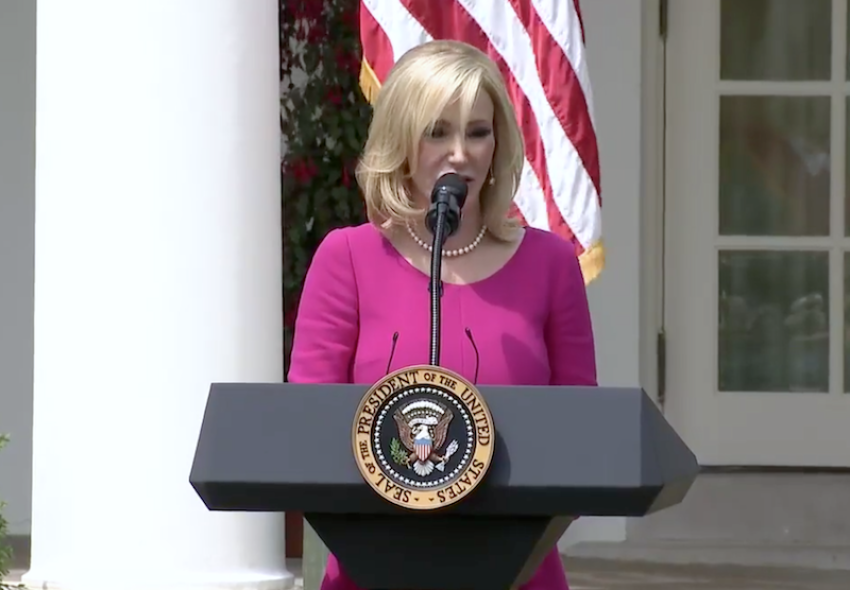Franklin Graham, Paula White, About 200 Evangelical Leaders Tell Congress to Pass Prison Reform Bill

Well-known evangelical leaders such as Franklin Graham, Paula White and Samuel Rodriguez are calling on members of Congress to pass bipartisan re-entry reform legislation that aims to provide federal prisoners with the training and rehabilitation they need to be successful once they are released back into society.
Hundreds of Christian leaders have signed onto a letter sent Wednesday to Speaker of the House Paul Ryan, House Minority Leader Nancy Pelosi and other congressional leaders voicing support for the Prison Reform and Redemption Act of 2017, also known as H.R. 3356.
The bill would expand programs that focus on their individual problems, such as drug rehabilitation, treatment for sexual addiction, job training, anger management or others. The legislation would also expand risk assessment to determine the best programs for individual prisoners.
Through completion of such programs, eligible prisoners would earn time credits and eligibility to complete their sentences under community supervision, in halfway homes or under home confinement.
Proponents of the legislation believe it will help reduce the federal recidivism rate.
Bureau of Justice Statistics studies have found that about two-thirds of released prisoners in the U.S. were rearrested within three years after release.
"Please move this legislation forward as quickly as possible," the letter, a copy of which was obtained by The Christian Post, states.
"Our work throughout the nation's prison system also affirms the need for our federal government to take practical actions, like those outlined in this bill, in order to reduce recidivism and to give our prisoners a better chance of rebuilding their lives, their families, and contributing to society," the letter continues. "As representatives of millions of religious Americans, we have seen how so many in our own communities have been affected by inadequacies in our prison system, and we believe there is widespread support for these reforms."
The letter was signed by prominent evangelical figures such as Graham, the president of the Billy Graham Evangelistic Association; White, President Donald Trump's spiritual adviser and a Florida pastor; other evangelical leaders who serve as informal advisors to the Trump administration and others who do not.
Signatories include Samuel Rodriguez of the National Hispanic Christian Leadership Conference, televangelist James Robison, former Southern Baptist Convention Presidents Ronnie Floyd and Jack Graham, Focus on the Family founder James Dobson, Liberty University President Jerry Falwell Jr., Southern Evangelical Seminary President and Christian Post Executive Editor Richard Land, Family Research Council President Tony Perkins, Faith & Freedom Coalition President Ralph Reed, American Association of Christian Counselors President Tim Clinton and Maryland pastor Bishop Harry Jackson.
Other notable signatories are former Major League Baseball all-star outfielder turned evangelist Darryl Strawberry and Jonathan Cain, the keyboardist for the popular rock band Journey who is also the husband of Paula White.
The legislation was introduced by Reps. Doug Collins, R-Ga., and Hakeem Jeffries, D-NY, and is co-sponsored by several Democrat and Republican lawmakers. The bill was scheduled for mark-up by the House Judiciary Committee this week but the mark-up was officially delayed on Wednesday.
"The delay in voting on the Prison Reform and Redemption Act in the House of Representatives is a disappointment to Prison Fellowship and the hundreds of thousands of prisoners and families we serve in our programs," Craig DeRoche, Prison Fellowship's senior vice president of advocacy and public policy, said in a statement Wednesday.
Although criminal justice and prison reform has increasingly become a bipartisan initiative, a faction of left-leaning criminal justice reform advocates are pressuring members of Congress to oppose the legislation because it does not include any reform to federal mandatory minimum sentencing laws.
"There is no disagreement about what is in the bill, the fight is over what has not been put in this legislation — and the people who pay the price for these delays are the men and women that are incarcerated today," DeRoche, who also supports sentencing reforms, asserted. "Delaying, or even killing these important reforms disregards the hope, dignity, value and potential of the people incarcerated today and will only serve the practical outcome of making America less safe by continuing the current recidivism rate."
The legislation follows a set of principles highlighted by the White House earlier this year that indicate what should be in a re-entry reform bill if President Trump is going to sign such legislation. The guidelines mentioned nothing about sentencing reform.
As some conservatives oppose reforms to mandatory minimums, some criminal justice reform activists think that a re-entry reform bill without sentencing reform included would have a greater chance to pass in the Senate.
"I strongly support sentencing reform but there is enough opposition in Congress that it would block the legislation as has happened for years now," Pat Nolan, director of the American Conservative Union Foundation Center for Criminal Justice Reform, recently told The Christian Post.
Wednesday's letter follows another letter sent to Congressional leaders this week by the heads of organizations like Prison Fellowship, the National Hispanic Christian Leadership Conference, Heritage Action, the Southern Baptist Convention's Ethics & Religious Liberty Commission, the Faith & Freedom Coalition and the National Association of Evangelicals.
"The revolving door of criminal justice is devastating to families and depresses economic activity in many communities. We owe it to the communities most affected by crime and incarceration to ensure that federal prisoners have the greatest possibility for rehabilitation while in prison and success upon release," the letter reads.
"Federal prisons should provide opportunities for men and women behind bars to make amends and earn back the public's trust. The regular use of risk assessment, individualized prison program plans, and opportunities for earlier release to community corrections, will be a significant step in transforming the federal prison system."
The organizations assured that H.R. 3356 will help inmates in federal prison "return home sooner and [be] better prepared to give back to their families and communities at their highest potential."



























